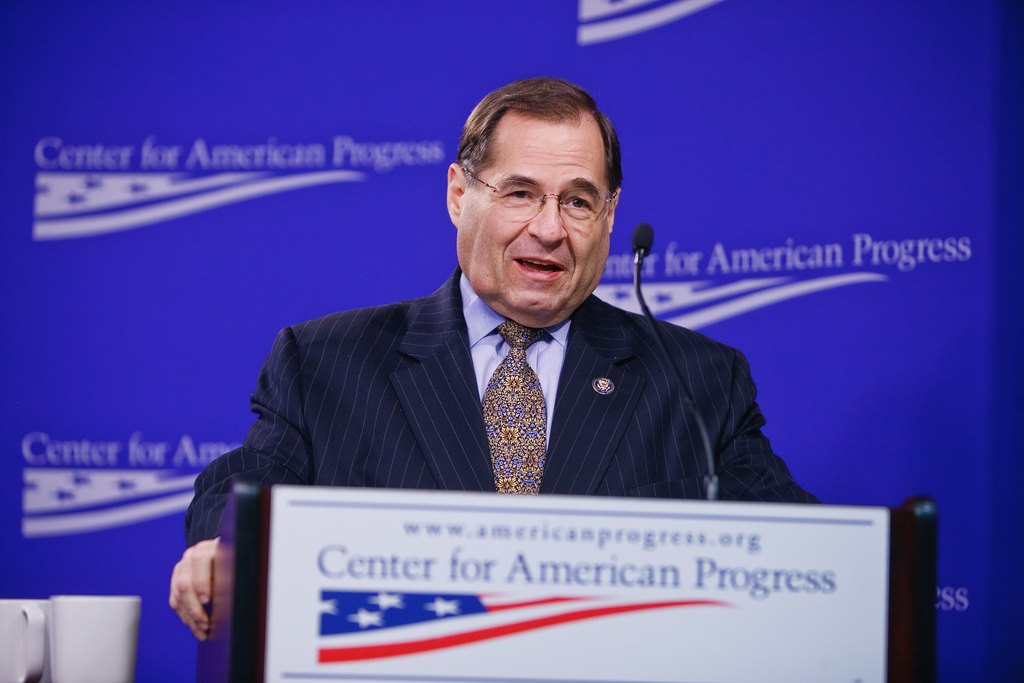by Ali Gharib
Will Democrats pay politically for supporting the Iran deal? At least where Democratic primaries are concerned, that doesn’t seem to be the case. On Tuesday, Rep. Jerry Nadler, an incumbent from New York with more than two decades in the House, overwhelming won his Democratic primary—with almost 90 percent of the vote—virtually ensuring him re-election this fall. The victory for a backer of the Iran deal is especially poignant considering that Nadler’s challenger, Oliver Rosenberg, a young former JP Morgan banker, made the race about Nadler’s support for diplomacy—then lost by a margin virtually unseen outside developing world dictatorships.
“Many people in the district felt betrayed,” Rosenberg said of Nadler’s support for the Iran deal. “This is their opportunity to send a message.” The district took Rosenberg up on the opportunity offered them: they sent a strong message of support for diplomacy with Iran.
The 10th congressional district of New York includes Manhattan’s Upper West Side and parts of Brooklyn, including more Jewish voters than any other congressional district. Forces opposing the Iran deal—Israel lobby groups and hawks like Washington’s neoconservatives—have assumed that these Jewish voters, especially religious conservatives in Brooklyn, want to excoriate any supporters of the Iran deal. But even the most Jewish congressional district in America refused to countenance this attack on Nadler’s pro-diplomacy vote.
Part of that may have to do with the way Rosenberg waged his campaign, which highlighted the vapidity of many of the Iran deal opponents’ broadsides against the deal’s supporters. And make no mistake: Rosenberg’s was a coalition built around opposing the Iran deal. The New York Daily News, in a ridiculous editorial that seemed to suggest that the nuclear deal would give Iran the bomb, backed Rosenberg. So did Dov Hikind, the New York state assembly member associated with Israel’s far right.
Rosenberg’s campaign launched vicious attacks on Nadler’s support for the Iran deal. In a robocall, octogenarian comedian Jackie Mason used the usual fear-mongering about the Iran deal. “And you know what happens to the Jews?” the comedian warned. “The Jews are facing the hydrogen bomb.” He also went so far as to question Nadler’s Jewish identity. “You would never know he was a Jew all his life,” Mason said on the call.
The line of attack shows how far off the rails opponents of the Iran deal have gone. The notion that Nadler, a staunch supporter of Israel who consulted with the Israeli embassy and AIPAC before making a tough decision to support the deal, is an enemy of the Jewish people is absurd. That much should be clear from the fact that Democratic New York Senator Chuck Schumer—an unreconstructed liberal pro-Israel hawk par excellence, who happened to oppose the Iran deal—supported Nadler. The attacks say much more about the Iran deal’s opponents than it does about its supporters.
One cannot buy into their notion that this deal is “bad for the Jews” or anti-Israel if one considers any viewpoint that diverges from the Likudnik orthodoxies of much of America’s Israel lobby. Israel’s security establishment is virtually united in favor of the deal—or at least acknowledging its benefits—and even a litany of right-wingers have come around to the notion. It’s tempting to say that the dead-enders still opposing the deal—and making their willingness to die on that hill be known—are trying to be holier than the pope.
Although opponents parrot right-wing Israeli Prime Minister Benjamin Netanyahu, liberals who supported the Iran deal are drawing on a well of support. The progressive juggernaut MoveOn overwhelming voted to endorse Nadler. “Jerry Nadler stood up when it mattered most to fight for diplomacy over war,” MoveOn Political Action director Ilya Sheyman said, adding that Nadler “courageously stood with President Obama and helped stop a war with Iran.” Obama made robocalls on Nadler’s behalf, providing a weighty counterpoint to a clown like Jackie Mason.
This is not to say that there won’t be other challenges to Iran deal supporters. Republican billionaires, who funded the core of opposition to diplomacy, are surely waiting in the wings to fund GOP campaigns based on attacking Iran diplomacy. But if Nadler’s overwhelming win is any indication, they are up against long odds.






Although Netanyahu failed to persuade the US Congress to defeat the Iran deal, he nevertheless achieved his main goal. That goal was to prevent any further cooperation between the US and Iran on mideast regional security. Even such “no brainer” cooperation against ISIS (where IRGC and Hezbollah are taking heavy casualties) or against the Taliban are now precluded. Bibi lost, but he really won. His comments the day after the congressional vote reflected that. Nadler’s constituents are not stupid. His services to the community on a whole host of issues go way beyond anything related to Israel. He does a great job for them